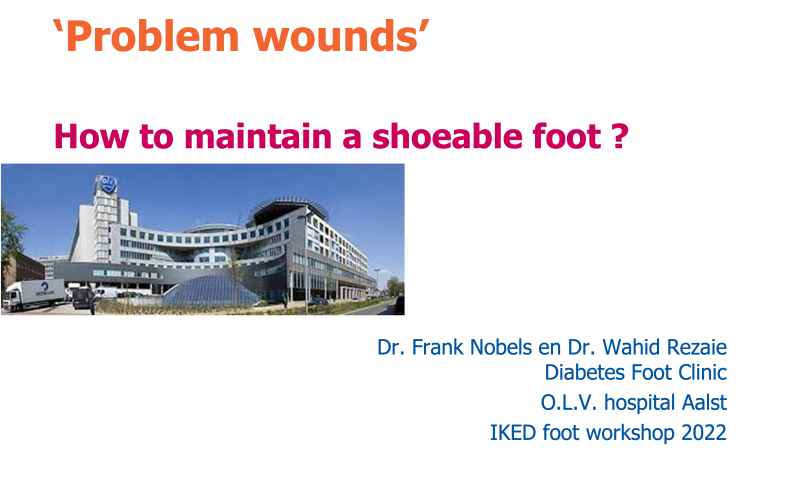
Workshop problem wounds: how to maintain a functional and shoeable foot?
IQED-Foot Information Meeting audit 7
Description
You are kindly invited to the IQED-Foot Information Meeting of audit 7, organized by Sciensano on behalf of the National Institute of Health and Disability Insurance (NIHDI). The meeting consists of several interactive workshop sessions, during which you will get the opportunity to discuss specific diabetic foot-related themes in more detail. Each participant is able to attend two workshops out of four proposed topics. Workshops will be given in English, but participants will receive a copy of the slides in Dutch or French. Please note that Accreditation “Ethics and economy” will be requested.
Programme
18:00 – 19:30 Registration and walking dinner
19:30 – 22:00 Workshops: participants choose 2 workshops out of 4 proposed topics. Every workshop takes 60 minutes and is organised by members of the Group of Experts.
22:00 End of the meeting
Workshops
Problem wounds: how to maintain a fucntional and shoeable foot?
Organized by: Dr. Frank Nobels, diabetologist – Dr. Wahid Rezaie, orthopaedic surgeon, from the Diabetic Foot Clinic OLV Aalst
Negative pressure therapy to a positive, healthy environment in diabetic foot wounds. The increased knowledge in the approach to diabetic foot wound has allowed the availability of several medical options to ensure the best local condition and wound healing. Among these, negative pressure wound therapy is a useful adjunct in the management of chronic and complex wounds to promote healing and wound bed preparation, in combination with offloading and other therapies as the need for antibiotics, for a vascular intervention, denridement,…
Negative pressure therapy to a positive, healthy environment in diabetic foot wounds
Organized by: Dr. Caren Randon, vascular surgeon from the Diabetic Foot Clinic UZ Gent — Dr. Sophie Deweer, diabetologist from the Diabetic foot Clinic AZ St-Elisabeth Zottegem
The efficacy of NPWT in promoting diabetic wound healing has been largely accepted. In this workshop we will evaluate through case reports and evidence based literature the effect of negative pressure wound therapy on diabetic foot wounds, especially for prevention or reduction of minor and major amputations, and for infection therapy. We emphasize on tips and tricks, points of attention and pitfalls.
Diabetic foot infections
Organized by: Dr. Michel Vandenbroucke, diabetologist from the Diabetic Foot Clinic AZ Sint-Maarten
Infections compromise both disease course and outcome of wound and foot problems in patients with diabetes. During this workshop, we explain recently published guidelines (IWGDF 2019, ADA 2019, IDF 2017, ACCP 2016) in translation to clinical practice in Belgian diabetic foot clinics. Topics include diagnostics, estimation of severity and scope, treatment, specific wound dressings and quality of life. We will demonstrate new technologies in a hands-on session. We count on your presence, but especially welcome your active interaction.
Benefits of systematic photo archiving of diabetic foot wounds
Organized by: Dr. Dimitri Aerden, vascular surgeon from the Diabetic Foot Clinic UZ Brussel
In most diabetic foot centers, digital photographs of diabetic foot ulcers are sporadically for archiving purposes. Objective assessment of wound healing is indeed greatly improved when pictures taken over different time intervals can be compared against each other. However, the benefit of taking pictures systematically (on each and every visit) may be more far-reaching than some realize. In this workshop, we argue that recorded pictures are great to assess a trend in wound healing, but also function as a patient motivational tool, a diagnostic tool, a safeguard against litigation, a repository for AI training, a communication tool. We also share some tips on optimal technology, workflow and ergonomics.